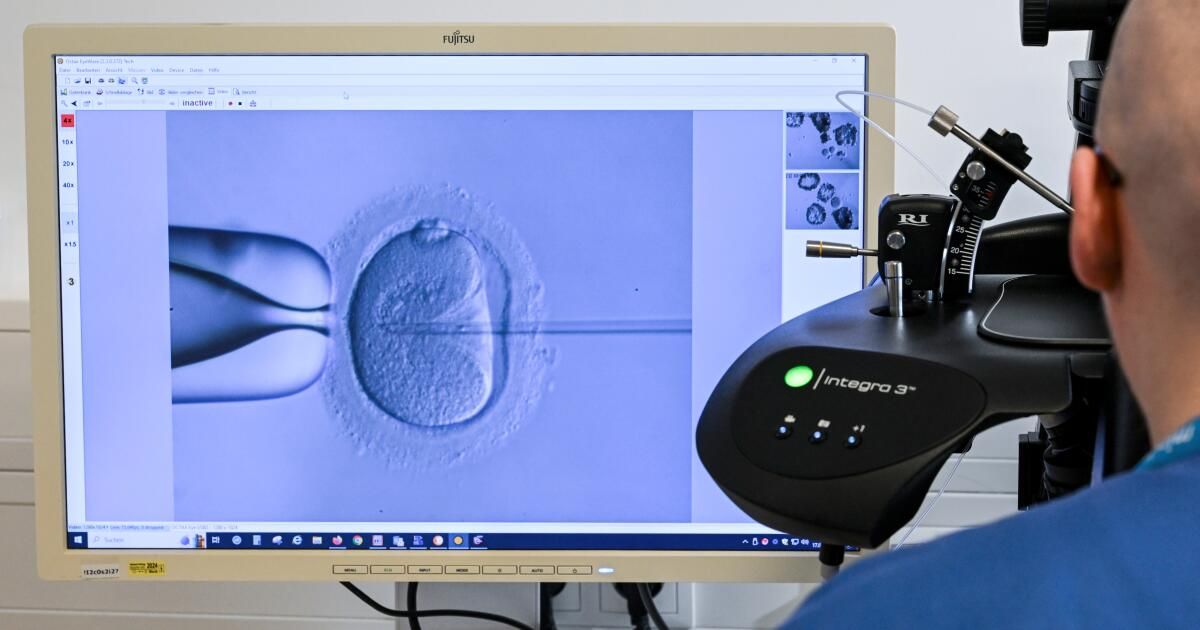Last month's decision by the Alabama Supreme Court finding that frozen embryos have the same rights as children took the personhood debate to a surreal level that should terrify anyone who supports the right to terminate a pregnancy or start one. in a laboratory through in vitro fertilization.
It was an absurd ruling: Three couples whose frozen embryos were accidentally destroyed at a fertility clinic were found to have the right to sue for wrongful death. But it is an example of the growing anti-abortion effort to redefine embryos (in the womb and in laboratory dishes) and fetuses as persons with a 14th Amendment right to equal protection under the law.
It's all part of the chaos over reproductive rights that has engulfed the country since the Supreme Court struck down the constitutional right to abortion in June 2022, and conservative states rushed to sign horrible new restrictions into law. Now conservative anti-abortion politicians and their supporters have finally discovered what it's like to have a court interfere with your reproductive freedom.
Alabama Republican and Democratic lawmakers quickly passed a bill Thursday to protect in vitro fertilization providers from criminal and civil liability; some clinics stopped procedures after the ruling. However, it was not a victory for reproductive rights, but just a stopgap measure that will be eliminated if the personhood movement gains more traction in state legislatures.
Since Roe v. Wade, more than a dozen states have introduced personhood bills that grant legal rights to fetuses or embryos, or both. Lawmakers in Iowa and Colorado have introduced bills that would define personhood as beginning with fertilization and subject to state homicide, wrongful death and assault laws, with no exceptions to IVF.
Last week, after the Alabama decision, Florida lawmakers shelved a bill that protected “unborn” children from wrongful death. But it's likely to return in some form.
And 18 members of the U.S. Senate and 166 members of the House of Representatives co-sponsored legislation in 2021 that would have conferred equal rights under the 14th Amendment to a fertilized egg. The bills have gone nowhere, but that could change depending on the outcome of the November election.
Several personality laws are already in force. A Georgia law called The Living Infants Fairness and Equality (LIFE) Act declares that a fetus is a person after six weeks of pregnancy and prohibits abortion after that point. Louisiana has a law that specifically prevents the destruction of embryos.
Abortion foes have been trying to change the narrative, with a series of new state laws., from punishing pregnant women to defending innocent fetuses, something that is easier to sell to the public. Even Alabama Supreme Court Chief Justice Tom Parker, in his concurrence, insisted that “even before they are born, all human beings bear the image of God, and their lives cannot be destroyed without erasing his glory.”
While personhood laws define that an embryo or fetus has legal rights, state fetal homicide laws vary in the extent to which they consider fetuses and embryos as potential victims. Some don't say anything about abortion. Others exclude it. California's murder statute extends to the murder of a fetus if done maliciously. But it specifically excludes abortion or any action taken by a person carrying the fetus.
This step toward declaring fetuses and embryos as persons with legal rights is one more reason we need a federal law protecting the right to abortion. The decisions voters make in this year's election will have huge implications for how much bodily autonomy women are allowed, and could set the course toward a dystopian future where their rights will be trumped by the rights of their embryos.
Even direct legislative efforts to protect IVF have stalled in Washington, DC. Sen. Tammy Duckworth (D-Ill.) attempted to turn bipartisan concern about the Alabama ruling into support for expediting passage of a bill that would protect an individual's right to IVF and a clinic. right to carry out the procedure. The bill would also allow the U.S. attorney general, an individual or a health care provider to sue a state or municipality that prevents or limits that access.
That was apparently all a bridge too far for Republican Sen. Cindy Hyde-Smith of Mississippi, whose “no” vote killed her chances. The emergency bill could only be approved with the unanimous support of the Senate. Hyde-Smith falsely claimed that the bill would, among other things, legalize human cloning and commercial surrogacy (which is already legal in some states).
The FIV ruling illustrates the further confusion that will arise from personality laws. The IVF procedure involves collecting several eggs to be fertilized and stored so that the patient can have several attempts to get pregnant or determine with her doctor which embryos are most likely to develop into a healthy pregnancy. If destroying unused embryos is a crime equivalent to killing, say, a baby, then Americans will lose another reproductive right.
Opponents of abortion have so fetishized embryos and fetuses that even as they support the concept of IVF, they cannot set aside their pursuit of personhood laws that may end up not only prohibiting abortion but also making unviable the IVF procedure that has been a life jacket. for so many people who cannot conceive on their own.












